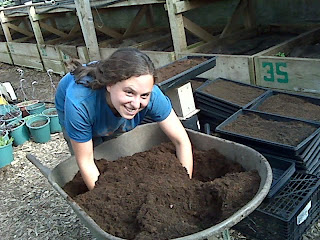I had been reading quite a bit about Will Allen's inspirational work in recent years: intensive greenhouse food production, vermiculture (worm composting), soil building (using "coir" -- compressed, shredded coconut husk), and, more recently, aquaponics. What I was really excited to see on the tour were the aquaponic systems: large, recirculating, multi-tiered tanks that mimicked a full ecosystem to grow both fish and plants for food. No chemicals added, just water. (Well, and plants, rocks, fish, and fish food.) Yellow perch and tilapia flourish for about a year before being harvested for a number of local chefs while watercress and other greens are regularly clipped for sale.
I spent two afternoons up to my elbows in coir, a substance which is mixed with worm castings -- aka worm poop -- to create the rich potting soil at Growing Power. Amazingly, one brick of dry coir expanded to a full wheelbarrow of shredded husk when soaked in water. Still, we needed a lot of the stuff to keep up with the 150 trays per day for sprout planting. Incidentally, scraping and sifting coir left me with unusually moisturized, exfoliated hands. No more calloused farmer hands for me! (Well, at least until the next farm.) Now you know what job to volunteer for when you stop by....
I am a bit enamored with soil building and composting operations, and they have a pretty sophisticated system here. But what really captured my imagination was the way the program reaches out and inspires so many people -- patrons, volunteers, donors, educators, the general public. Everyone in the city knows about Will and about the program. Talk about home town pride.
People flock to the operation. I suspect that this is partly due to Mr. Allen's recent McArthur genius grant and features in The New York Times catapulting the organization into the limelight. But it's not just hype: he really is a genius. He has figured out how to make fresh, mostly local food accessible -- both in terms of location and cost -- to large, underserved communities, and do it sustainably. Take the "Market Basket" program, where I worked with a small staff to pack hundreds of bags of fresh produce on Thursday afternoon. The program is so popular that middle-class families are signed up for the weekly pick-up alongside foodies, lower-income folks, and college students. The year-round, CSA-style produce bags range from $9 (a "senior" half-size) to an all-organic, full-sized bag for something like $30. There's a size and a price range for everyone, and because some don't know from week to week what their cashflow will be, instead of the up-front commitment of a CSA share patrons decide from one week to the next what (and whether) to order. It was a lot of food, even the half size. (I could have handled it, mind you, but they don't skimp on the fresh goodies.)
I did not have the good fortune to meet the man of whom I've read and heard so much. I did see his fishing pole leaning up against the tilapia tank during the tour. But his presence is everywhere: in the varied designs for the fish tanks which he is constantly striving to perfect, in the way everyone who has met him in person speaks of him almost wistfully. One day I hope to meet him (and not faint from excitement). In the meantime, I hope the program continues to grow and flourish.
Sent from my Verizon Wireless BlackBerry





No comments:
Post a Comment
Thanks for your comment! Just making sure this isn't spam.... Thanks for your patience. :)Ibti